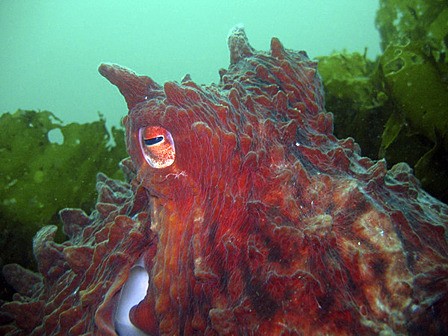Beautiful, bashful and brainy, the giant Pacific octopus leads a life of mystery. With a personality that’s as complex as its appearance, this animal is a master of disguise that can open jars, mimic other octopuses, and solve mazes in lab tests.
Tim Carpenter, Curator of Fish and Invertebrates at the Seattle Aquarium will give a free public lecture entitled “Super Suckers: Giant Octopus and other Cephalopods” on Monday, March 8 on Lopez at the Public Library and Tuesday, March 9 on Orcas at Camp Orkila at 7 pm.
Like squid, octopuses are cephalopods, meaning “head-foot,” so named because the feet (arms) are attached to the head. Octopuses have a highly developed brain and acute vision. The North Pacific Giant Octopus, or the Giant Pacific Octopus, is distinguished from other species by their sheer size. Adults can weigh around 33 lbs, with an arm span of up to 14 feet.
Octopus live to be about four years old; with both males and females dying soon after breeding. Females live long enough to tend fastidiously to their eggs, but they do not eat during this months-long brooding period.
To make up for its relatively short life span, the octopus is extremely prolific. It can lay up to 100,000 eggs which are intensively cared for by the females. Hatchlings are about the size of a grain of rice, and only a very few survive to adulthood.
This will be the last lecture of the 2009/10 Marine Science Lecture Series, which was created to inspire the general public and to highlight the amazing fish and wildlife of our region. Park in the upper parking lot at Camp Orkila. Shuttle service from the parking lot to the talk is available before and after the lecture.




